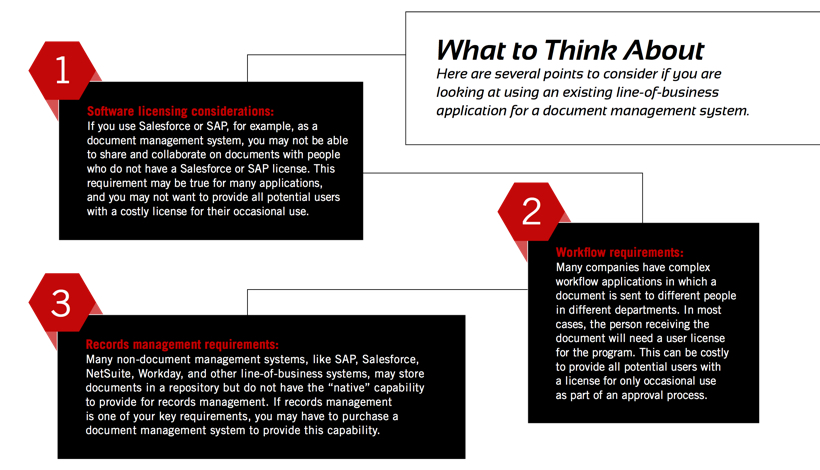
Image by: MaryValery, ©2016 Getty Images
After you have determined that you need a document management system, and developed your basic requirements, how do you locate the right document management system? Of course, a Google search turns up millions of hits (13,400,000 results for the term “document management system”), Gartner and Forrester reports provide some names and insight (though very limited selection), and Internet sites list major vendors, but are you really finding a broad selection of vendors for your project? Are you actually missing a vendor that is already providing services to your company?
Here is a list of potential starting places for your search that you may not have thought of (but may already own some, or all, of the software).
Currently installed software applications, like Salesforce or Workday, can accept and store documents in their native format (DOCX, PDF, etc.) and can serve as a simplified document management system. Review your current in-house applications and determine if they can meet your needs. You may be surprised to know that they are already being used. One potential drawback is that these applications may not support true document management capabilities and may require additional licenses in order to share and collaborate on documents with non-application users.
Also, some applications, like Salesforce, can support other applications like Box. For example, you may have Salesforce as your primary customer relationship management (CRM) system and use Box to store and manage the documents.
In-house line-of-business systems, like SAP or Fiserv, have document management connections or embedded systems. SAP, for example, works with OpenText to provide document management solutions, and SAP already knows your business. Fiserv embeds OnBase by Hyland into its products so that you already have document management capabilities, but you may not know it. In many cases, the primary software vendor, like SAP, will serve as the prime contractor and be the single source of support. This avoids the problem of finger-pointing if, and when, problems occur.
Business services and product vendors, like Ricoh, Konica Minolta, SharpUSA, Fujitsu, or Canon, work with a variety of document management vendors to provide document management capabilities, either embedded in the product or as a partner program. Some vendors may offer limited scan and store, while others may offer complete document management services. Some companies may also provide in-house services and be able to staff, for example, a mail center in which all mail is scanned and delivered as a digital image or supplement your information technology (IT) department and manage the document management application.
Vertical industry software application specialists only work in selected industries, such as human resources (HR), medical, construction, food services, legal, etc. This type of company may either own its own software product or build custom applications using other third-party software. If you are an accounting or HR services organization, there may be a company that specializes in your industry and includes document management capabilities into their product or service. For example, a law practice may provide financial accounting services, firm management, and practice management in addition to document and records management services that are custom-built or tightly integrated with a document management system.
System integrators are companies that, generally speaking, do not own their own document management system but do partner with one or several document management vendors and develop integrations into line-of-business systems or develop unique, custom integrations based on requirements. A system integrator has the skillset to build a custom solution that may include, for example, engineering drawings, project management, time management, document management, and accounting. These elements may be tied together into a single tool, and the user may not know that he/she is accessing a document or uploading a document into different systems.
Software vendors of document management are the product owners/manufacturers, such as OpenText, Hyland, Laserfiche, SpringCM, etc. These companies have developed the software and have also, over the years, purchased and integrated other products into their original product line. For example, many document management vendors purchased standalone records management companies and integrated that product into their offerings, while some vendors purchased similar document management companies to supplement their own product or to provide a lower cost product offering.
This category is highly diverse and ranges from simple electronic file cabinets to solutions that are highly developed and can scale to worldwide enterprise systems with thousands of users. Also, within the last 10 years, the industry has been disrupted by cloud storage and sync vendors, collectively known as enterprise file sync and share (EFSS) systems, that are typically cloud-based applications.
Today, depending on your needs, standalone document management software vendors can be loosely grouped as follows:
Currently installed software applications, like Salesforce or Workday, can accept and store documents in their native format (DOCX, PDF, etc.) and can serve as a simplified document management system. Review your current in-house applications and determine if they can meet your needs. You may be surprised to know that they are already being used. One potential drawback is that these applications may not support true document management capabilities and may require additional licenses in order to share and collaborate on documents with non-application users.
Also, some applications, like Salesforce, can support other applications like Box. For example, you may have Salesforce as your primary customer relationship management (CRM) system and use Box to store and manage the documents.
In-house line-of-business systems, like SAP or Fiserv, have document management connections or embedded systems. SAP, for example, works with OpenText to provide document management solutions, and SAP already knows your business. Fiserv embeds OnBase by Hyland into its products so that you already have document management capabilities, but you may not know it. In many cases, the primary software vendor, like SAP, will serve as the prime contractor and be the single source of support. This avoids the problem of finger-pointing if, and when, problems occur.
Business services and product vendors, like Ricoh, Konica Minolta, SharpUSA, Fujitsu, or Canon, work with a variety of document management vendors to provide document management capabilities, either embedded in the product or as a partner program. Some vendors may offer limited scan and store, while others may offer complete document management services. Some companies may also provide in-house services and be able to staff, for example, a mail center in which all mail is scanned and delivered as a digital image or supplement your information technology (IT) department and manage the document management application.
Vertical industry software application specialists only work in selected industries, such as human resources (HR), medical, construction, food services, legal, etc. This type of company may either own its own software product or build custom applications using other third-party software. If you are an accounting or HR services organization, there may be a company that specializes in your industry and includes document management capabilities into their product or service. For example, a law practice may provide financial accounting services, firm management, and practice management in addition to document and records management services that are custom-built or tightly integrated with a document management system.
System integrators are companies that, generally speaking, do not own their own document management system but do partner with one or several document management vendors and develop integrations into line-of-business systems or develop unique, custom integrations based on requirements. A system integrator has the skillset to build a custom solution that may include, for example, engineering drawings, project management, time management, document management, and accounting. These elements may be tied together into a single tool, and the user may not know that he/she is accessing a document or uploading a document into different systems.
Software vendors of document management are the product owners/manufacturers, such as OpenText, Hyland, Laserfiche, SpringCM, etc. These companies have developed the software and have also, over the years, purchased and integrated other products into their original product line. For example, many document management vendors purchased standalone records management companies and integrated that product into their offerings, while some vendors purchased similar document management companies to supplement their own product or to provide a lower cost product offering.
This category is highly diverse and ranges from simple electronic file cabinets to solutions that are highly developed and can scale to worldwide enterprise systems with thousands of users. Also, within the last 10 years, the industry has been disrupted by cloud storage and sync vendors, collectively known as enterprise file sync and share (EFSS) systems, that are typically cloud-based applications.
Today, depending on your needs, standalone document management software vendors can be loosely grouped as follows:
- On-premise software in which you purchase and own the software, and it is installed on your own servers.
- Subscription-based EFSS-style software in which you do not own the software but pay a monthly subscription fee, such as Box, Dropbox, Huddle, and others.
- Hybrid systems that can reside on both your own servers and in a cloud (which may be your own cloud or the vendor’s cloud). Accellion is an example of a hybrid EFSS-type system.
Service bureaus are companies that originally specialized in converting paper to electronic files for day-to-day operations or one-time efforts, but today, they may provide paper-to-electronic conversion and electronic-to-electronic conversion (from one document management system to another), and many have become resellers of the software they use internally or system integrators for higher value projects. Service bureaus range from small, local shops in your immediate geographic area or may be nationwide with locations in major cities. The advantage of using a service bureau is that they will have deep experience in handling paper conversions and will understand many aspects of paper-based workflows and conversion to electronic documents. Search for “document scanning conversion services” and add in your state for local results.
There are many options open to you when seeking a document management system. Many companies go directly to a list of document management vendors that they find through an Internet search, but this won’t provide all of the vendors that may provide a solution for your needs.

In many cases, a company may have several ongoing efforts in different departments for a document management system, and these teams may not be aware of each other or all of the options available to them. If possible, prior to a “vendor search” for a document management system, first, ensure that you form a team that can collectively represent all of the departments within your company. Next, list all of the current in-house vendors that you have supplying line-of-business applications, like SAP, Workday, or Salesforce, and office business services, like Ricoh, Konica Minolta, or Sharp. Next, review each of the providers/vendors and determine if they have a document management system that could be used for your project.
You may also find that departments are already using some type of cloud-based document management and that the system being used has potential to scale up to an enterprise-wide system instead of a departmental one. Furthermore, these existing systems, which are used by different departments, could be “integrated” into one.
The takeaway for this article is: Don’t be satisfied with the obvious or well-known vendors. Broaden your search and include in-house vendors you may not have thought provided document management services and products.
Bud Porter-Roth has over 20 years of experience as an ECM consultant. Contact Bud at budpr@erms.com or follow him on Twitter @BudPR.






















